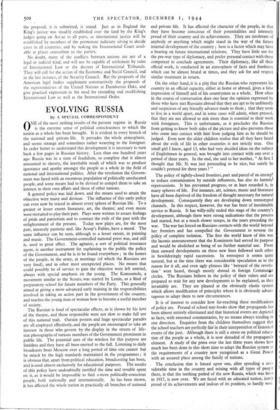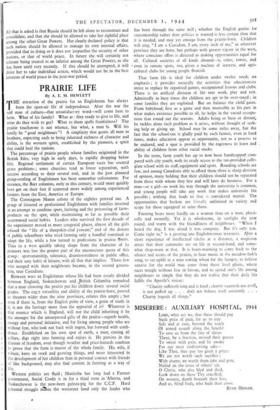EVOLVING RUSSIA
By A SPECIAL CORRESPONDENT
ONE of the most striking results of the present regime in Russia is the extreme sense of political consciousness to which the nation as a whole has been brought. It is evident in every branch of the national and private life. It pervades the whole atmosphere, and seems strange and sometimes rather wearying to the foreigner. In order better to understand this development it is necessary to turn back a few pages in Russian history. Less than one hundred years ago Russia was in a state of feudalism, so complete that it almost amounted to slavery, the inevitable result of which was to produce ignorance and apathy amongst the people as a whole in the field of national and international politics. After the revolution the Govern- ment was faced with an enormous population of politically uneducated people, and some means had to be devised to compel them to take an interest in their own affairs and those of other nations.
A general policy was laid down, and the means used to attain the objective were many and devious. The influence of this early policy can even now be traced in almost every sphere of Russian life. To a greater or lesser extent literature, art, the theatre; and even music were recruited to play their part. Plays were written to assure feelings of pride and patriotism and to contrast the evils of the past with the enlightenment of the present. Today new plays are, for the most part, intensely patriotic and, like Aesop's Fables, have a moral. The same influence can be seen, although to a lesser extent, in painting and music. The Government-controlled national press was, and still is, used to great effect. The agitator, a sort of political insurance agent, is another instrument for explaining to the public the policy of the Government, and he is to be found everywhere ; in the homes of the people, in the army, at meetings (of which the Russians are very fond), and in other most unexpected places. No means that could possibly be of service to gain the objective were left untried, always with special emphasis on the young. The Komsomols, a movement similar to the Scouts, was started by Lenin, as a kind of preparatory school for future members of the Party. This generally aimed at giving a more advanced early training in the responsibilities involved in taking an active part in the government of the country, and teaches the young man or woman how to become a useful member of society.
The Russian is fond of spectacular effects, as is shown by his love of the theatre, and those responsible were not slow to make full use of this national trait. Outsize posters and huge spectacular parades are all employed effectively, and the people are encouraged to take an interest in those who govern by the display in the streets of life- size photographs of various members of the Government prominent in public life. The potential uses of the wireless for this purpose are limitless and they have all been exerted to the full. Listening to daily broadcasts from Moscow over a long period of time one cannot but be struck by the high standards maintained in the programmes ; it is obvious that, apart from political education, broadcasting has been, and is used almost exclusively for educational purposes. The results of this policy have undoubtedly justified the time and trouble spent on it, as it would be impossible to find. a more politically-conscious people, both nationally and internationally. As has been shown, it has affected the whole nation in practically all branches of national
and private life. It has affected the character of the people, in that they have become conscious of their potentialities and intensely proud of their country and its achievements. They are intolerant of anybody or anything which might stand in the way of the future internal development of the country ; here is a factor which may have a bearing on future international relations. They have little use for the pre-war type of diplomacy, and prefer personal contact with those competent to conclude agreements. Their diplomacy, like all their official work, is conducted in an atmosphere of facts and frankness which can be almost brutal at times, and they ask for and respect similar treatment in return.
On the other hand, it is a pity that the Russian who represents his country in an official capacity, either at home or abroad, gives a false impression of himself and of his countrymen as a whole. How often in the course of conversation does one hear the opinion expressed by those who have met Russians abroad that they are apt to be unfriendly and suspicious of any friendly advance made to them ; that they seem to live in a world apart, and in some cases will admit, when pressed, that they are not allowed to mix more than is essential to their work with foreigners. This is unfortunate, as it precludes the Russian from getting to know both sides of the picture and also prevents those who come into contact with him' from judging him as he should be judged. Even now the older children realise that all they have heard about the evils of life in other countries is not strictly true. One small girl I knew, aged 13, who had very decided ideas on the subject of Englishmen in general, was brought into contact with one over a period of three years. In the end, she said to her mother, " At first I thought that Mr. N. was just pretending to be nice, but surely he couldn't pretend for three years ? "
The policy of tightly-closed frontiers, part and parcel of an attempt to reduce contamination by outside influences, has also its harmful repercussions. It has prevented progress, or at least retarded it, in many spheres of life. For instance, art, science, music and literature have all been deprived of the freedom of thought necessary for natural development. Consequently they are developing down stereotyped channels. In this respect, however, the war has been of inestimable service to Russia. It has willy-nilly ended this stage of the country's development, although there were strong indications that the process had started, but at a much slower tempo, in the years preceding the war. The war has forced on Russians contacts with the world beyond her frontiers and has compelled the Government to reverse the policy of complete isolation. The first the world knew of this was the laconic announcement that the Komintern had served its purpose and would be abolished as being of no further material use. From then onward developments on these new lines followed each other in bewilderingly rapid succession. In retrospect it seems quite natural, but at the time there was considerable speculation as to the reason for it all, and even ugly phrases like betrayal of the revolu- tion' were heard, though mostly abroad in foreign Communist circles. The Russians believe in the policy of their rulers and are prepared to wait for any new developments to be explained, as they invariably are. They are pleased at the obviously elastic system which allows modification of principles where it is obviously advan- tageous to adapt them to new circumstances.
It is of interest to consider how far-reaching these modifications of policy are. Perusal of school text-books show that propaganda has been almost entirely eliminated and that historical events are depicted as facts, with reasoned commentaries, by no means always tending in one direction. Enquiries from the children themselves suggest that the school teachers are perfectly fair in their interpretation of historical events of the past. Although there is still a stress on political educa- tion of the people as a whole, it is now denuded of the propaganda element. A study of the press over the last three years shows how much has been done in this short time to adapt the Russian system to the requirements of a country now recognised as a Great Power with an assured place among the family of nations.
, The conclusion that is forced upon one, after spending a con- siderable time in the country and mixing with all types of people there, is that the teething period of the new Russia, which was born in 1917, is now over. We are faced with an educated nation, justly proud of its achievements and jealous of its position, so hardly won All that is asked is that Russia should be left alone to reconstruct and consolidate, and that she should be allowed to take her rightful place among the other Great Powers. Her clearly declared policy is that each nation should be allowed to manage its own internal affairs, provided that in doing so it does not jeopardise the security of other nations, or that of world peace. In future she will certainly not tolerate being treated as an inferior among the Great Powers, as she has been until very recently. If this should be attempted, it will drive her to take individual action, which would not be in the best interests of world peace in the post-war period.



























 Previous page
Previous page